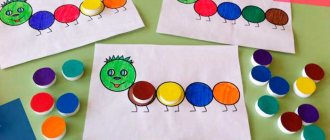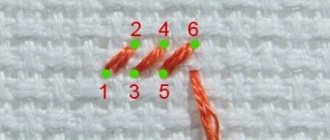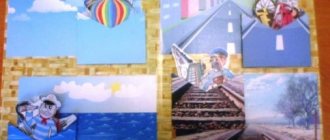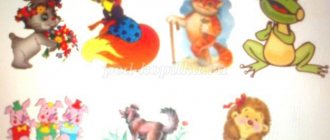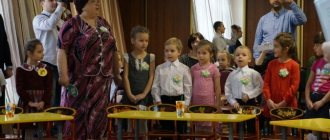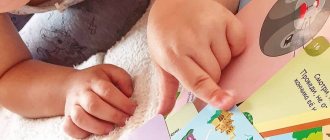Games and toys for kids
Contained in sections:
- Didactic games 32101
- Sensory development and education. Sensory 6541
Includes sections:
- Didactic and sensory aprons and skirts 100
- Smell. Games, manuals “Recognize by smell” 9
- Velcro games 102
- Keyboard games 12
- Games with rubber bands 63
- Flashlight games 32
- Palms. Games, teaching aids 50
- Marbles. Games with pebbles 185
- Couple, pick a couple, couple pictures 279
- Pick up a patch. Games, teaching aids 65
- Clothespins. Games with clothespins for children 485
- Tactile development of children. Games and aids 436
- Color, learning colors. Games, teaching aids 1497
- Laces. DIY games with laces 167
- Noise boxes. Games, teaching aids 24
By groups:
- Junior group
Showing publications 1-10 of 1203. All sections | Sensory games
New
Photo
The best
Didactic game on sensory education in an early age group “Razvivashka”
Dear colleagues, I present to your attention a didactic game on sensory education “Development”. The didactic game was made by hand, from different materials. Didactic games are an effective means for developing a child’s sensory perception . They take into account...
Didactic games for the development of sensory abilities of children of early preschool age “Didactic games for the development of sensory abilities of children of early preschool age” Childhood, namely “early” is that period of a child’s life when he does not know how to do a lot of things, does not understand, but thanks to hostile mechanisms, he has a predisposition to everything...
Educational games for children of the senior group of kindergarten card file (senior group) on the topic
Educational games for children in the senior group of kindergarten
Games aimed at developing logic in senior preschoolers
Game "Find options".
Goal: to develop logical thinking and intelligence.
Game material and visual aids: cards with the image of 6 circles.
Description: give the child a card with a picture of 6 circles, ask them to paint them in such a way that there are equal numbers of filled and unshaded figures. Then view and calculate all painting options. You can also hold a competition to see who can find the largest number of solutions.
Game "Wizards".
Goal: to develop thinking and imagination. Game material and visual aids: sheets depicting geometric shapes.
Description: Children are given sheets depicting geometric shapes. Based on them, it is necessary to create a more complex drawing. For example: rectangle - window, aquarium, house; circle - ball, snowman, wheel, apple. The game can be played in the form of a competition: who can come up with and draw the most pictures using one geometric figure. The winner is awarded a symbolic prize.
Game "Collect a flower".
Goal: to develop thinking, the ability to analyze and synthesize.
Game material and visual aids: cards depicting objects related to the same concept (clothing, animals, insects, etc.).
Description: each child is given a round card - the middle of the future flower (one - a dress, the second - an elephant, the third - a bee, etc.). Then the game is played in the same way as in lotto: the presenter distributes cards with images of various objects. Each participant must assemble a flower from cards, the petals of which depict objects related to the same concept (clothing, insect, etc.).
Game "Logical endings".
Goal: to develop logical thinking, imagination, ability to analyze.
Description: children are asked to complete the sentences:
• Lemon is sour, and sugar... (sweet).
• You walk with your feet, but throw... (with your hands).
• If the table is higher than the chair, then the chair... (below the table).
• If two are more than one, then one... (less than two).
• If Sasha left the house before Seryozha, then Seryozha... (left later than Sasha).
• If the river is deeper than a stream, then the stream... (smaller than a river).
• If the sister is older than the brother, then the brother... (younger than the sister).
• If the right hand is on the right, then the left hand... (on the left).
• Boys grow up to become men, and girls... (women).
Game "Ornament".
Goal: to develop logical thinking and the ability to analyze.
Game material and visual aids: 4-5 groups of geometric shapes (triangles, squares, rectangles, etc.), cut out of colored cardboard (figures of one group are divided into subgroups differing in color and size).
Description: invite the child to consider how you can create ornaments from geometric shapes on a playing field (sheet of cardboard). Then lay out the ornament (according to a model, according to your own plan, under dictation), using concepts such as “right”, “left”, “above”, “below”.
Game "Helpful - Harmful."
Goal: to develop thinking, imagination, ability to analyze.
Description: consider any object or phenomenon, noting its positive and negative sides, for example: if it rains, this is good, because plants drink water and grow better, but if it rains for too long, this is bad, because plant roots can rot from excess moisture.
Game “What did I wish for?”
Goal: develop thinking.
Game material and visual aids: 10 circles of different colors and sizes.
Description: lay out 10 circles of different colors and sizes in front of the child, invite the child to show the circle that the teacher ordered. Explain the rules of the game: when guessing, you can ask questions, only with the words more or less. For example:
- Is this circle bigger than red? (Yes.)
- Is it bigger than blue? (Yes.)
- More yellow? (No.)
- Is this a green circle? (Yes.)
Game "Plant Flowers".
Goal: develop thinking.
Game material and visual aids: 40 cards with images of flowers with different petal shapes, sizes, and core colors.
Description: invite the child to “plant flowers in the flowerbeds”: in a round flowerbed all flowers with round petals, in a square flowerbed - flowers with a yellow core, in a rectangular flowerbed - all large flowers.
Questions: what flowers were left without a flowerbed? Which ones can grow in two or three flower beds?
Game "Group by characteristics."
Goal: to consolidate the ability to use generalizing concepts, expressing them in words.
Game material and visual aids: cards with images of objects (orange, carrot, tomato, apple, chicken, sun).
Description: place cards in front of the child with images of different objects that can be combined into several groups according to some characteristic. For example: orange, carrot, tomato, apple - food; orange, apple - fruits; carrots, tomatoes - vegetables; orange, tomato, apple, ball, sun - round; orange, carrots - orange; sun, chicken - yellow.
Game "Remember faster."
Goal: develop logical thinking.
Description: invite the child to quickly remember and name three round objects, three wooden objects, four pets, etc.
Game "Everything that flies."
Goal: develop logical thinking.
Game material and visual aids: several pictures with various objects.
Description: invite the child to select the proposed pictures based on the named characteristic. For example: everything is round or everything is warm, or everything is animate that can fly, etc.
Game "What is it made of"
Goals: develop logical thinking; consolidate the ability to determine what material an object is made of.
Description: the teacher names some material, and the child must list everything that can be made from it. For example: tree. (You can use it to make paper, boards, furniture, toys, dishes, pencils.)
Game “What Happens...”
Goal: develop logical thinking.
Description: invite the child to take turns asking each other questions in the following order:
- What is big? (House, car, joy, fear, etc.)
- What is narrow? (Path, mite, face, street, etc.)
— What happens to be low (high)?
— What is red (white, yellow)?
— What is long (short)?
Features of educational games in the younger group
Game is a unique mechanism that allows you to develop various qualities in a child. Thus, educational games in the younger group allow you to develop the child’s psyche, attention, fine motor skills, and logical thinking. Educational games for the youngest children have as their main goal the overall development of the child and his preparation for the next stage of development - preschool age.
In early preschool age, it is important to teach a child abstract thinking, logical analysis, planning and forecasting, and correct perception of the surrounding reality. Developmental games for preschool children are based on careful study and characterization of objects. Children are offered puzzles, mosaics, and various geometric shapes that develop the child’s spatial orientation. As a rule, in a preschool institution, games are played in groups, when children work together to solve assigned problems. Doing tasks in a group allows the child to learn how to work in a team, learn to coordinate their actions with the actions of other children, thereby learning the basics of relationships.
Educational games in kindergarten in the younger group are selected taking into account the developmental characteristics of children 3-5 years old. At this age, children are characterized by a certain independence and intolerance to adult help during games. The child strives to complete the task independently. As a rule, being under the care of parents, the child does not receive the same freedom of action as in kindergarten, where the child, being in a group of peers, cannot receive full attention from the teacher. The main task of the teacher is to monitor the child’s actions, analyze his abilities, acquired skills and abilities, as well as correct the educational process so that each child in the group receives comprehensive development.
Special attention in teaching and raising children in kindergartens is paid to physical development. Educational games in kindergarten are organized so that the child moves during the game and receives a certain physical activity. One of the exciting activities for children in the younger group is playing with suspended multi-colored paper butterflies, which will only be able to “fly” when the children blow on them with all their might. In this simple and uncomplicated game, the child develops coordination and lungs. The game can be modified and supplemented with the task of making the butterflies fly in a certain sequence: first red, then yellow, then blue.
Educational games in kindergarten: functions of games in the educational process
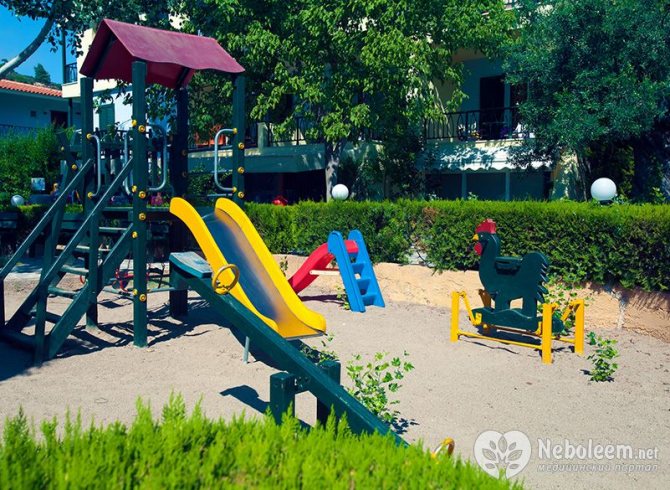
Attending kindergarten is an important stage in the life of any child. It is in the process of kindergarten education that the child gains his first experience of communicating with elders and peers, learns new models of behavior, and gets used to organizing the day. One of the main functions of any preschool institution is the education and development of the child. Every child learns about the world around him through games and toys.
A game is a form of activity and interaction between participants in the process, the main motive of which is to model a certain situation in a simplified form and test it in practice. Play for a child begins at an early age with learning about the world around him by studying surrounding objects and comparing them. The main elements of play for a child are both toys and objects from the surrounding world. The first year of a child’s life is characterized by the most intensive development and acquisition of basic skills, which will only improve in the future. With the acquisition of new skills and experience, the games that interest the child become more complex. Educational games in kindergarten contribute to the development of perception, logical, creative thinking, memory, attention, and imagination. Another important characteristic of educational games in dow is the socialization of the child, his involvement in team play, learning to evaluate and distribute roles.
Unlike the educational games that children enjoy at home, educational games in kindergarten are completely controlled by the teacher. Depending on the type of preschool institution, educational games in a preschool can be aimed at correcting certain conditions (physical development, mental development, speech therapy defects) and developing creativity.
Educational games in kindergarten are offered to children taking into account the age, level of development, abilities, and capabilities of the children. It should be noted that games in the younger group differ significantly from the games offered to children in older groups of kindergartens. What are these differences?

